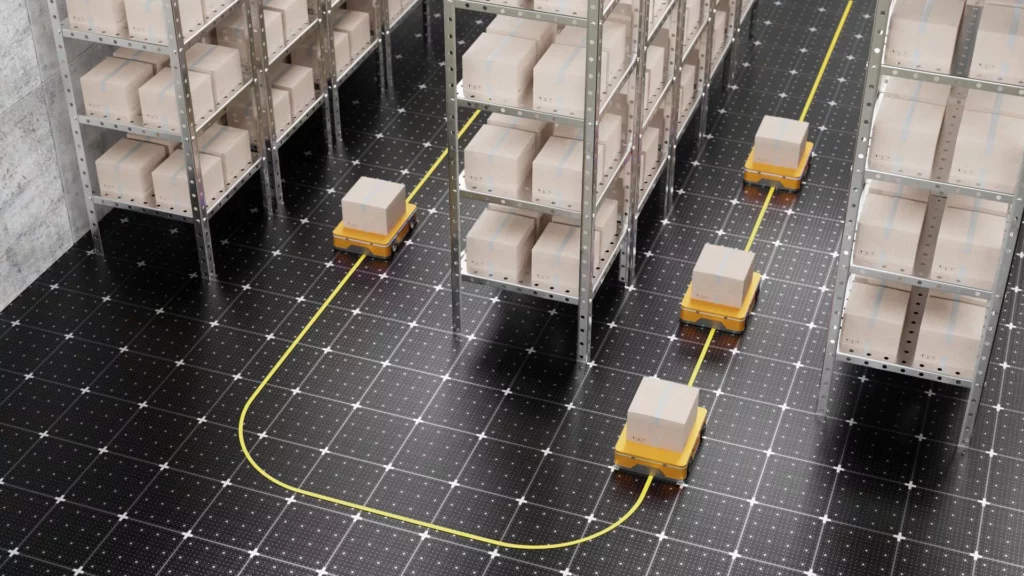
The Impact of AI on Efficiency and Operations in Logistics
Technology has been the driving force of the economy since the invention of the wheel—the first self-propelled vehicle, personal computer … and finally, artificial intelligence (AI). The latter has emerged as a truly transformative force across various industries, in particular in the logistics sector. Critical tools like real-time tracking and predictive analytics are reshaping how logistics operations are conducted, taking them to the previously unreachable level.
The adoption of AI technologies enables logistics companies to anticipate demands more accurately, manage supply chains more efficiently, and drastically improve overall productivity. AI helps build more predictive and adaptive operational systems, offering significant improvements in efficiency and customer satisfaction.
Enhancing Efficiency through AI in Warehouse Management
Employing artificial intelligence (AI) can dramatically enhance the efficiency of warehouse operations. Thus, according to insights from FreightWaves, AI technologies allow for optimizing tasks that were traditionally labor-intensive and error-prone, such as picking, packing, sorting, and storing goods. Through robotics and automated systems, logistics operators can revolutionize the way their warehouses function.
FreightWaves highlights that some warehouses have reported a significant increase in operational efficiency, together with reductions in operational costs, following the adoption of AI-driven systems. Such efficiency arises from the ability of automated systems to operate continuously without the need for breaks, leading to longer productive hours and a decrease in the labor costs associated with manual warehouse operations.
Integrated with AI, robots can navigate large warehouse spaces more efficiently, retrieving items with precision and speed that surpass human capabilities. This automation reduces the possibility of human error, speeds up order fulfillment, and ultimately enhances customer satisfaction. Automated systems contribute to better inventory management, ensuring that stock levels are accurately maintained and updated in real-time, preventing both overstock and stockouts.
AI-enabled robotics can adapt to varying inventory sizes and demand spikes without additional human labor. This adaptability improves operational scalability and contributes to a more resilient supply chain, as well as streamlines logistics operations, setting new standards in logistics efficiency.

Optimizing Transportation with AI
AI has proven efficient in simplifying complex logistics processes and addressing cost-related challenges. As reported by FreightWaves and based on numerous studies, AI technologies can analyze vast amounts of data to identify the most efficient routes and predict potential delays due to traffic or weather conditions.
AI-driven route optimization algorithms take into account real-time traffic data, vehicle capacity, delivery windows, and even historical travel times to devise the most efficient paths for delivery fleets. This significantly reduces drive times and fuel consumption, contributing to lower operational costs and a smaller carbon footprint. For instance, implementing AI in route planning has been shown to reduce fuel usage by up to 10%, reflecting substantial cost savings and environmental benefits.
AI’s capability to dynamically adjust transportation schedules in response to real-time changes in the supply chain can revolutionize how logistics companies manage their fleets. Such flexibility ensures that transportation resources are used more efficiently, minimizing idle times and improving the responsiveness of delivery services. Statistics say that AI-enabled systems can improve the utilization of transportation assets by up to 20%, thereby enhancing overall operational efficiency.
AI-driven improvements are not just theoretical; they are being implemented by leading logistics providers to transform their transportation operations. Enhanced route optimization and dynamic scheduling enable logistics companies to meet customer expectations more reliably and with greater cost efficiency, directly translating into competitive advantages.
The Future of Logistics with Cloud and AI Integration
The integration of cloud computing and artificial intelligence (AI) is setting the stage for a future where logistics operations run fast and efficiently while remaining well-protected and personalized. As outlined by Maersk, the synergy between cloud technology and AI creates an expansive framework that allows for more agile, scalable, and intelligent logistics solutions. This integration ensures seamless data collection, storage, and analysis, enhancing decision-making processes across the supply chain.
Cloud computing provides the necessary infrastructure for AI algorithms to access vast amounts of data in real time. This capability is crucial for AI to effectively predict demand patterns, optimize routes, and manage inventory dynamically. As highlighted by Maersk, cloud-enabled AI systems can continuously learn and adapt from data, leading to progressively smarter logistics solutions that anticipate the needs of businesses and end consumers.
Looking forward, the future of logistics will heavily rely on autonomous operations. This includes self-coordinating logistics networks where AI-driven vehicles and drones operate seamlessly to deliver goods. Such systems would reduce human intervention, lower the potential for errors, and increase the speed of delivery.
AI’s ability to analyze consumer behavior and preferences could also transform logistics into a more customer-focused industry. Tailored delivery options, predictive shipping, and personalized logistics services are all possibilities that could become commonplace. As per Maersk, this level of personalization improves customer satisfaction and optimizes logistics performance by aligning operations closely with actual consumer needs.
The integration of cloud and AI is the next step towards shaping a new transformative era in logistics, where operations are faster, more cost-effective, and increasingly centered around the end-user’s experience. This evolution points to a future where logistics companies quickly respond to market demands while shaping them through technology.
A Call to Action
The transformative impact of artificial intelligence (AI) on the logistics industry is evident. AI applications in warehouse management, transportation optimization, and the integration of cloud technologies are already enhancing logistics operations, setting the stage for future advancements. These technologies enable more efficient route planning, reduce operational costs, and improve overall service delivery.
Looking ahead, AI has the potential to revolutionize logistics further and address existing challenges such as delivery speeds, cost efficiency, and environmental sustainability. With ongoing advancements in AI and cloud computing, the logistics industry stands on the doorsteps of a new era where operations are smarter, more responsive, and increasingly consumer-focused.
As the industry moves forward, industry professionals must consider how AI can streamline their current operations and innovate their processes to stay competitive. It’s high time to embrace AI and cloud technologies to transform logistical frameworks, enhance efficiency, and lead the charge toward more dynamic and predictive logistics.
You May Be Interested In
How to Implement a Successful Last-Mile Delivery Strategy
The final leg of delivery, known as last-mile delivery, assumes a critical role in shaping the customer experience, with the potential to either make or break it. Despite its brevity, it profoundly influences customer contentment and loyalty to a brand, making it a critical consideration for businesses…
Set pricing in Expedited Freight Shipping: What are the benefits?
The struggle between maintaining low transportation costs and ensuring dependable carrier capacity is as old as the logistics industry. Brokers continually grapple with the dual challenge of minimizing transportation costs without compromising speed, service, and carrier capacity…